Merrily We Go to Hell Blu-ray Movie
HomeMerrily We Go to Hell Blu-ray Movie 
Criterion | 1932 | 83 min | Not rated | May 11, 2021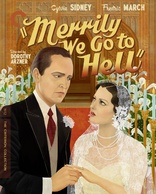
Movie rating
6.9 | / 10 |
Blu-ray rating
| Users | 0.0 | |
| Reviewer | 3.5 | |
| Overall | 3.5 |
Overview
Merrily We Go to Hell (1932)
An heiress marries a reporter with a weakness for booze and a blonde.
Starring: Sylvia Sidney, Fredric March, Adrianne Allen, Richard 'Skeets' Gallagher, George IrvingDirector: Dorothy Arzner
| Romance | Uncertain |
| Drama | Uncertain |
| Comedy | Uncertain |
Specifications
Video
Video codec: MPEG-4 AVC
Video resolution: 1080p
Aspect ratio: 1.37:1
Original aspect ratio: 1.37:1
Audio
English: LPCM Mono (48kHz, 24-bit)
Subtitles
English SDH
Discs
Blu-ray Disc
Single disc (1 BD)
Playback
Region A (locked)
Review
Rating summary
| Movie | 3.5 | |
| Video | 4.5 | |
| Audio | 4.0 | |
| Extras | 2.0 | |
| Overall | 3.5 |
Merrily We Go to Hell Blu-ray Movie Review
Reviewed by Dr. Svet Atanasov June 20, 2021Dorothy Arzner's "Merrily We Go to Hell" (1932) arrives on Blu-ray courtesy of Criterion. The supplemental features on the disc include new video essay by film historian Cari Beauchamp and archival documentary. In English, with optional English SDH subtitles for the main feature. Region-A "locked".
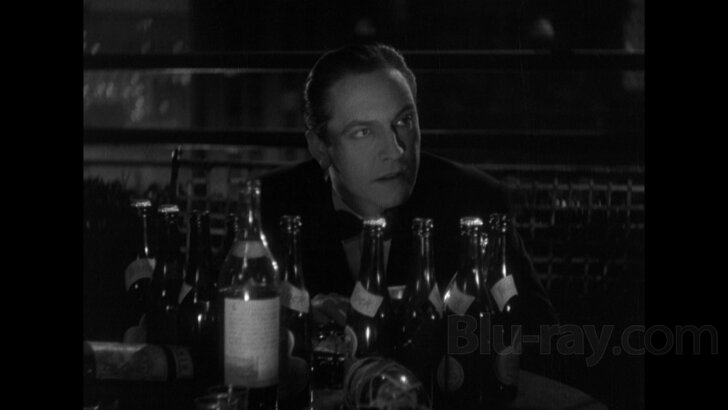
The alcoholic
If you love something, let it go. If it comes back to you, it’s yours forever. If it does not, then it was never meant to be. It is unclear who produced this statement, but it is supposed to be true. At the very end of Adrian Lyne’s film Indecent Proposal, Demi Moore’s character utters it before she comes back to her heartbroken husband. The sequence is very beautiful, but the statement ruins it for me because I don’t believe a single word of it. I would like to explain why because it will make it easier for you to understand why I dislike the finale of Dorothy Arzner’s film Merrily We Go to Hell as well.
In Lyne’s film, Moore’s character and her husband make a deal with a millionaire that ought to help them keep their dream home. They meet him in Las Vegas after losing all of their savings, and he offers to pay them one million dollars if Moore’s character agrees to spend a single night with him. Initially, they reject his ‘indecent proposal’, but a million dollars is a lot of money and after a long night of discussing ‘what if’ scenarios in their hotel room, they surrender. On the following day, the millionaire transfers the money to their bank account and takes Moore’s character to his luxury yacht. Financial problems gone, a dream home and perfect future secured. But the pre-arranged date very quickly breaks the couple’s marriage and Moore’s character moves in with the millionaire -- until eventually she realizes her mistake and goes back to her husband. It is a great story for a romantic drama, but incompatible with the message that emerges from the statement that is quoted at the top of this article. Why? Two reasons. First, if two people are truly in love, why would one of them feel the urge to ‘let’ the other go? Letting someone go implies that a forceful action must have occurred in the past, which instantly invalidates the assumption that the couple was ever truly in love. Second, there are countless ways in which an error of judgement can test a relationship, but only if the error is temporary. The one that Moore’s character does isn't. After the date with the millionaire, she expands the error while inventing false moral pretexts to rationalize her actions. Admittedly, the eventual reunion isn’t entirely unrealistic, but it does not prove that Moore and her husband were meant to be together. The film just ends there to make you feel good. In the real world, the two would be just a few months, possibly a year away from another permanent breakup.
In Arzner’s film, the very wealthy socialite Joan Prentice (Sylvia Sydney) and aspiring reporter Jerry Corbett (Fredric March) meet at a lavish party and begin dating. Convinced that they were meant to be together, the two quickly marry and move away from the bride's wealthy family so that they don’t have to constantly meet meaningless expectations. But the groom's alcohol addiction and inexorable desire to have a second woman (Adrianne Allen) in his life quickly complicate his relationship with the bride and they begin drifting apart. However, instead of immediately going to work to fix their relationship the two temporarily settle down for an 'open marriage' that is supposed to gradually help them become like their parents.
The pre-Code era produced a great number of films whose understanding and depiction of human drama are actually much more convincing than those of contemporary films. In Arzner’s film, the drama is quite interesting to observe as well -- with its take on ‘open marriage’ in particular revealing a degree of objectivity that is rather astonishing -- but its tone is mismanaged. The main reason behind this flaw is Arzner’s struggle to shoot the bride's efforts to regain her husband in a way that captures properly the seriousness of his condition. Indeed, in the second half it looks a lot like the newlyweds are simply engaged in a big humiliating competition rather than a decisive battle for the future of their relationship. On top of this, the film insists on discovering humor in their shared misery as well.
The proper tone would have been the one that Billy Wilder introduced in The Lost Weekend. It still would have allowed Arzner to discover humor in some difficult situations, but the actions of the two leads would have been seen very differently. Also, the entire film would have been far more convincing without the happy reunion. Just like the reunion in Lyne’s film, it is too idealistic, undoubtedly temporary as well.
Merrily We Go to Hell Blu-ray Movie, Video Quality 
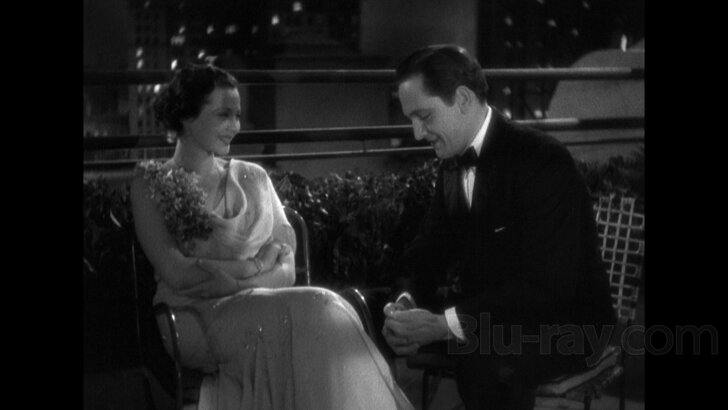
Presented in its original aspect ratio of 1.37:1, encoded with MPEG-4 AVC and granted a 1080p transfer, Merrily We Go to Hell arrives on Blu-ray courtesy of Criterion.
The following text appears inside the leaflet that is provided with this Blu-ray release:
"This new digital transfer was created in 4K resolution on a Lasergraphgics Director film scanner from a 35mm composite duplicate negative at Roundabout Entertainment in Burbank, California. Thousands of instances of dirt, debris, scratches, splices, and warps were manually removed using MTI Film's DRS, while Digital Vision's Phoenix was used for jitter, flicker, small dirt, grain, and noise management. The original monaural soundtrack was remastered from a 35mm optical track using Avid's Pro Tools and iZotope RX.
Colorist: Lee Kline/Criterion Post, New York."
The film looks healthy, but it is immediately obvious that it has aged quite a lot. For example, there are plenty of small density fluctuations that impact delineation and clarity. Some darker shadow nuances are not optimal as well. Even contrast levels occasionally become a tad shaky. However, these are the type of source limitations that are often unavoidable on films from the early 1930s and 1940s, so the important point to underscore here is that overall the film still has a very pleasing organic appearance. Despite some minor transition issues, image stability is very good. The grayscale is very convincing as well. In fact, the excellent grading job does the most to offset some of the aging effects that are highlighted above. My score is 4.25/5.00. (Note: This is a Region-A "locked" Blu-ray release. Therefore, you must have a native Region-A or Region-Free player in order to access its content).
Merrily We Go to Hell Blu-ray Movie, Audio Quality 
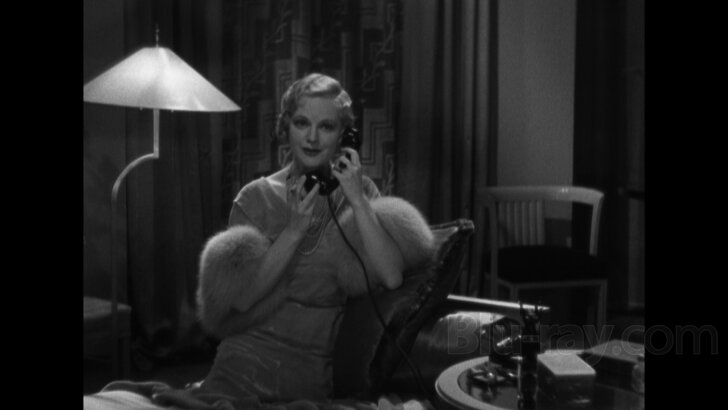
There is only one standard audio track on this Blu-ray release: English LPCM 1.0. Optional English SDH subtitles are provided for the main feature.
Clarity and stability are very good. However, if you turned up the volume slight more than usual, the fragility of the upper becomes quite obvious. To ve perfectly clear, there are no anomalies that would affect negatively your viewing experience, but you know that the audio has aged just as much as the video.
Merrily We Go to Hell Blu-ray Movie, Special Features and Extras 
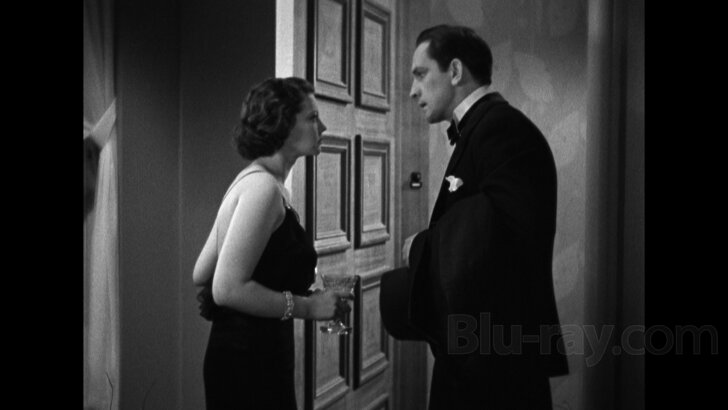
- Cari Beauchamp - in this new video essay, film historian Cari Beauchamp discusses the production of Merrily We Go to Hell and Dorothy Arzner's career. In English, not subtitled. (27 min).
- Dorothy Arzner: Longing for Women - an archival program that takes a closer look at the life and legacy of Dorothy Arzner produced by Katja Raganelli in 1980. In English and German, with optional English subtitles where neccasary. (47 min).
- Leaflet - an illustrated leaflet featuring an essay by film scholar Judith Mayne as well as technical credits.
Merrily We Go to Hell Blu-ray Movie, Overall Score and Recommendation 
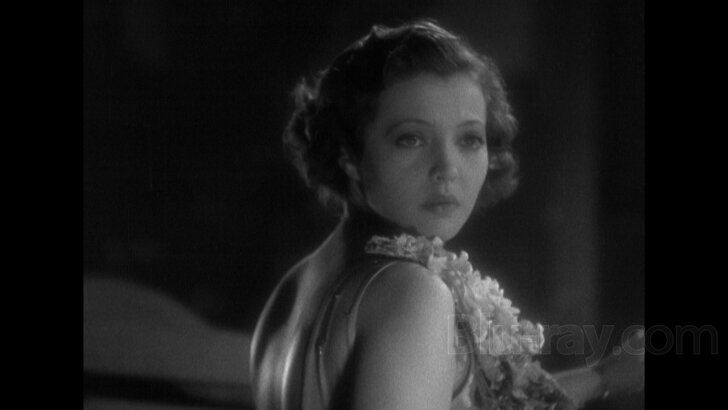
Merrily We Go to Hell would have been a groundbreaking film if it had the darker, more pessimistic tone of The Lost Weekend. When the newlyweds began drifting apart, for a while I actually expected that a dramatic transformation introducing a very similar tone was inevitable. But the drama remained very light and eventually was replaced with conventional soapy melodrama that wrapped up the film with a predictably uplifting finale. So, I did not dislike the film, but I had very high expectations and they were not met. Criterion's release is sourced from a new and very good 4K restoration. RECOMMENDED to fans of the film.
Similar titles
Similar titles you might also like

Hobson's Choice
1954

Bluebeard's Eighth Wife
1938

Saving Face
2004

Millie
1931

The Philadelphia Story
1940

Great Expectations
1946

Arthur
1981

The Woman Between
1931

Angel
1937

That Funny Feeling
1965

My Man Godfrey
1936

A New Leaf 4K
Standard Edition
1971

A Tale of Autumn
Conte d'automne / Autumn Tale
1998

It Happened One Night
1934

Written on the Wind
1956

Beloved Infidel
Limited Edition to 3000 - SOLD OUT
1959

God's Own Country
2017

Like Water for Chocolate
Como agua para chocolate
1992

The Wedding Banquet
Xi yan / 喜宴
1993

Monsoon Wedding
2001